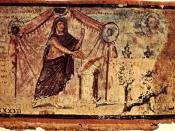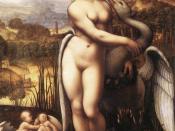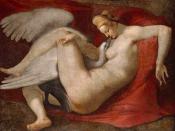By The viewpoint of both stories where the Gods are described as being impersonal is just a manifestation that God's see humans as play things.
In the Iliad, most of what the Gods do to humans have in large part have to do with their respect for fate. Fate is the predestined end for all mankind which Zeus chooses for everybody. If a God has a grudge against a human for not supplicating to ask him for assistance the God cannot help his enemy to destroy him without first asking Zeus for permission, so one could describe fate as ultimately Zeus's will. For instance, when the Argives built the wall during the time when both the Trojan and Argives were burying their dead Poseidon became infuriated when Agamemnon forgot to make a sacrifice offering to him. Poseidon was promised by Zeus that only after the war and Troy's predestined destruction could Poseidon take his revenge on Agamemnon by crushing the wall.
In Leda and the Swan, fate is introduced as a "sudden blow" (Yeats 1) for which the Leda is not ready for. Fate, who is Zeus, takes the form of a swan that at its outer appearance seems like a peaceful creature, however his actions by "beating" (Yeats 1) his wings making Leda "stagger" (Yeats 2) and holding her down illustrates his power over her. The description of Yeats to describe Zeus's "feathered glory loosening her thighs" (Yeats 6) showed her willingness to let Zeus enter her. Her understanding that the swan was Zeus came when he appeared from a "sudden blow", which is symbolic for thunder for which Zeus is known as the thunder God. The description of Yeats of her fingers as "vague" (Yeats 5) shows that although she felt that it was a violation to...



Not up to your own standards
If this is a final draft, I am disappointed. I've read your work and this seems too choppy. You had a very good point, but you fail to keep it flowing. Your sentences are wordy, and you are in need of comma usage. The point is good, but the paper needs more work.
3 out of 3 people found this comment useful.